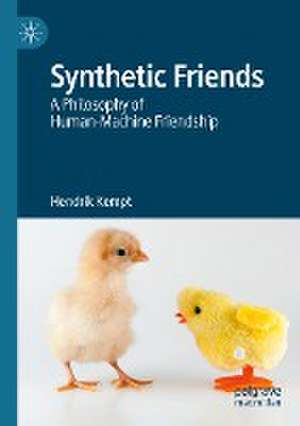Synthetic Friends: A Philosophy of Human-Machine Friendship
Autor Hendrik Kempten Limba Engleză Paperback – 29 sep 2023
This book explores the notion of whether we can be friends with machines in a philosophically meaningful way. Depending on our concept of friendship, we may be inclined to answer differently. Since social technology has made new forms of friendships possible between people across the globe, the author argues that the philosophical concept of friendship, forged thousands of years ago, should be re-examined. The author proposes a new approach to the debate that reflects the unique relationship we can build with machines as our synthetic friends.
| Toate formatele și edițiile | Preț | Express |
|---|---|---|
| Paperback (1) | 381.98 lei 6-8 săpt. | |
| Springer International Publishing – 29 sep 2023 | 381.98 lei 6-8 săpt. | |
| Hardback (1) | 388.13 lei 6-8 săpt. | |
| Springer International Publishing – 28 sep 2022 | 388.13 lei 6-8 săpt. |
Preț: 381.98 lei
Nou
Puncte Express: 573
Preț estimativ în valută:
73.09€ • 76.16$ • 60.52£
73.09€ • 76.16$ • 60.52£
Carte tipărită la comandă
Livrare economică 03-17 aprilie
Preluare comenzi: 021 569.72.76
Specificații
ISBN-13: 9783031136337
ISBN-10: 3031136330
Ilustrații: IX, 211 p. 1 illus.
Dimensiuni: 148 x 210 mm
Greutate: 0.27 kg
Ediția:1st ed. 2022
Editura: Springer International Publishing
Colecția Palgrave Macmillan
Locul publicării:Cham, Switzerland
ISBN-10: 3031136330
Ilustrații: IX, 211 p. 1 illus.
Dimensiuni: 148 x 210 mm
Greutate: 0.27 kg
Ediția:1st ed. 2022
Editura: Springer International Publishing
Colecția Palgrave Macmillan
Locul publicării:Cham, Switzerland
Cuprins
Chapter 1 – Introduction.- Chapter 2 - Why even?.-Chapter 3 - Critical Perspectives.- Chapter 4 - Social Philosophy of Technology.- Chapter 5 - Concepts and Theories of Friendship.- Chapter 6 - Digital Hermits.- Chapter 7 - Synthetic Friends .- Chapter 8 - Social Integration.- Chapter 9 – Criticism.- Chapter 10 - Almost a conclusion
Recenzii
“Regardless of whether the reader is predisposed to accept or reject the idea of synthetic friends, reading this book is time well spent.” (Anthony J. Duben, Computing Reviews, April 13, 2023)
Notă biografică
Hendrik Kempt is Research Associate at the Applied Ethics Group at RWTH Aachen, Germany. He was previously a visiting scholar at the University of Southern California and Brown University, USA. He is editor of RuPaul's Drag Race and Philosophy (2020) and author of “Chatbots and the Domestication of AI” (Palgrave Macmillan, 2020) as well as several articles on the topic of human-machine interaction.
Textul de pe ultima copertă
Friendship is an important human good. Most (though perhaps not all) humans crave it. Why does it matter so much? What brave new world of friendship awaits us with the advent of machines that are able to mimic human-like behaviours and relationship styles? Hendrik Kempt’s book takes a deep dive into these topics and rewards the reader with a rich and philosophically nuanced analysis of the possibility of friendship with technology. Anyone interested in the future of friendship should read this book.
- John Danaher, Lecturer in the School of Law at NUI Galway, IrelandThis book explores the notion of whether we can be friends with machines in a philosophically meaningful way. Depending on our concept of friendship, we may be inclined to answer differently. Since social technology has made new forms of friendships possible between people across the globe, the author argues that the philosophical concept of friendship, forged thousands of years ago, should be re-examined. The author proposes a new approach to the debate that reflects the unique relationship we can build with machines as our synthetic friends.
Hendrik Kempt is Research Associate at the Applied Ethics Group at RWTH Aachen, Germany. He was previously a visiting scholar at the University of Southern California and Brown University, USA. He is editor of RuPaul's Drag Race and Philosophy (2020) and author of “Chatbots and the Domestication of AI” (Palgrave Macmillan, 2020) as well as several articles on the topic of human-machine interaction.
Caracteristici
Explores the notion that we can be friends with machines in a philosophically meaningful way Argues in favor of those relationships potentially contributing to a good life Outlines features of these “synthetic friends” and the friendships we may have with them
